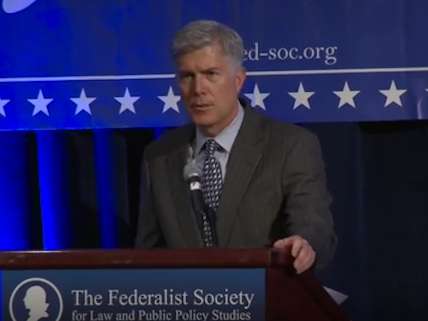What Neil Gorsuch's Book on Assisted Suicide Reveals About His Views on Abortion Rights

The issue of abortion is guaranteed to come up this week when the Senate Judiciary Committee begins confirmation hearings on the nomination of Judge Neil Gorsuch to the U.S. Supreme Court.
As a federal judge, Gorsuch's record on abortion is basically silent. He has not had the opportunity to write an opinion in a major abortion rights case. But his scholarly record is a different matter. Gorsuch's non-judicial writings contain several powerful clues about his views on the constitutionality of abortion.
In his 2006 book The Future of Assisted Suicide and Euthanasia, for example, Gorsuch rejected the case for legalizing assisted suicide on the grounds that "human life is fundamentally and inherently valuable, and the taking of human life by private persons is always wrong." That language seemingly points in an anti-abortion direction.
Furthermore, in that same book, Gorsuch questioned whether the Supreme Court had any business defending any sort of unenumerated constitutional rights under the Due Process Clause of the 14th Amendment. Drawing on the work of conservative legal scholar Robert Bork, Gorsuch argued that the Due Process Clause has been stretched "beyond recognition" when the Court interpreted it to be "the repository of other substantive rights not expressly enumerated in the text of the Constitution or its amendments."
The most famous modern cases dealing with "substantive rights not expressly enumerated in the text of the Constitution or its amendments" are Griswold v. Connecticut (1965), which recognized a constitutional right to privacy, and Roe v. Wade (1973), which said the right to privacy included "a woman's decision whether or not to terminate her pregnancy." Both cases cited the Due Process Clause of the 14th Amendment as a supporting authority.
Gorsuch's arguments about the Due Process Clause strongly suggest that he believes both Griswold and Roe were wrongly decided. The unanswered question is whether or not he believes those decisions should be overturned by the Supreme Court in future cases.
The Senate Judiciary Committee should ask him about that during this week's confirmation hearings.
Related: Questions for Neil Gorsuch on Congressional Power, Executive Power, and Constitutional Rights


Show Comments (91)